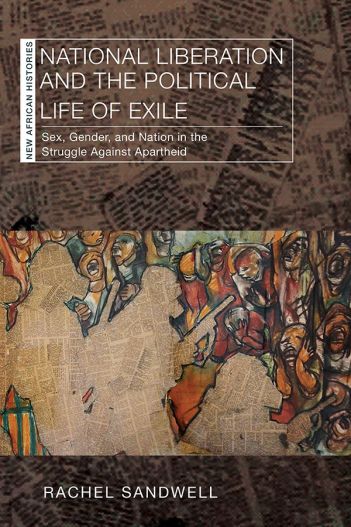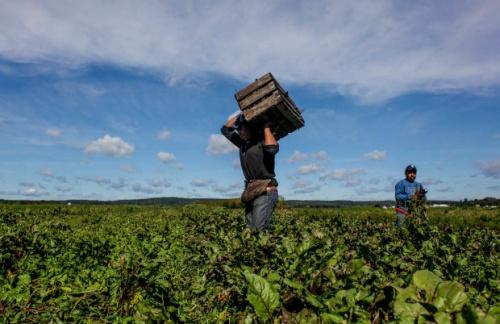Institute for African Development
Barbadian Emigration to Liberia: Transnational Blackness in the Making of an African Nation

March 16, 2026
3:00 pm
160, Mann Library
TBD
Additional Information
Program
Einaudi Center for International Studies
Latin American and Caribbean Studies
Institute for African Development
Migrations Program
Women in Exile Shaped South Africa's ANC

Rachel Sandwell, IAD
According to a new book by Rachel Sandwell (IAD), South African women played a major role in the fight against apartheid with their diplomatic work and advocacy for sex education, birth control, and childcare.
Additional Information
Information Session: Graduate Student Opportunities at the Einaudi Center

February 9, 2026
4:30 pm
Uris Hall, G08
Join us to learn about opportunities for graduate students with the Einaudi Center for International Studies. This session will discuss how to discover or strengthen global interests, including research and travel grants, guest lectures, fellowships, and more!
Can't attend? Email programs@einaudi.cornell.edu for more information.
Additional Information
Program
Einaudi Center for International Studies
Reppy Institute for Peace and Conflict Studies
East Asia Program
Southeast Asia Program
Latin American and Caribbean Studies
Institute for European Studies
South Asia Program
Migrations Program
Institute for African Development
Southwest Asia and North Africa Program
Addressing and Eradicating Xenophobia in the Southern Africa Region: An Interdisciplinary Approach

March 26, 2026
10:00 am
University of Johannesburg Kingsway Campus, Auckland Park, n/a
26-27 March 2026 University of Johannesburg Kingsway Campus, Auckland Park
Abstract Submission: 15 January 2026 Notification of Speaker and Abstract Decisions: 10 February 2026 Conference Registration Opens: 10 March 2026 Conference Fee: R3000.00
Organizers: Cornell Law School, University of Johannesburg Faculty of Law, University of Zambia, and the Centre for International and Comparative Labour
We are calling for abstracts to be submitted from around the globe. Abstract should not exceed 150 words and include up to 5 keywords. Full papers should not exceed 8000 words. All submitted abstracts, papers will go through a double–blind peer– review process with decisions and comments availed to all authors. Final acceptance is only granted upon revising the manuscript in line with the reviewer's comments. Acceptance of the manuscript is subject to review and approval by the publishers. Publication in the proceedings and presentations at the conference are subject to registration and submission of copyright forms. Submit abstracts to suhailv@uj.ac.za
Additional Information
Program
Einaudi Center for International Studies
Institute for African Development
Conference: Addressing and Eradicating Xenophobia in the South African Region: An Interdisciplinary Approach

March 26-27,2026 University of Johannesburg Kingsway, Campus Auckland Park
organized by Cornell Law School, University of Johannesburg Faculty of Law, University of Zambia, and Centre for international and Comparative Labour and Social Security Law
Trump's Farmer Bailout Won't Stop China Trade War Pain

Chris Barrett, IAD/SEAP
Chris Barrett, professor of agricultural and development economics, provides an analysis of the farm sector’s financial losses resulting from the trade war and the inadequacy of government bailouts.
Additional Information
Information Session: Laidlaw Scholars Leadership & Research Program

January 6, 2026
11:00 am
The Laidlaw Scholars Leadership and Research Program promotes ethical leadership and international research around the world—starting with the passionate leaders and learners found on campuses like Cornell. Open to first- and second-year students, the two-year Laidlaw program provides generous support to carry out internationally focused research, develop leadership skills, engage with community projects overseas, and become part of a global network of like-minded scholars from twenty universities worldwide.
At this session, we'll share more information about the program, including independent international projects with the Einaudi Center’s trusted partners around the world for the summer 2026 leadership-in-action portion of the program, and tips for writing a successful application. Applications are due January 12, 2026.
Register here. Can’t attend? Contact programs@einaudi.cornell.edu.
Additional Information
Program
Einaudi Center for International Studies
Reppy Institute for Peace and Conflict Studies
East Asia Program
Southeast Asia Program
Latin American and Caribbean Studies
Institute for African Development
Institute for European Studies
South Asia Program
Southwest Asia and North Africa Program
Information Session: Laidlaw Scholars Leadership & Research Program

December 16, 2025
2:00 pm
The Laidlaw Scholars Leadership and Research Program promotes ethical leadership and international research around the world—starting with the passionate leaders and learners found on campuses like Cornell. Open to first- and second-year students, the two-year Laidlaw program provides generous support to carry out internationally focused research, develop leadership skills, engage with community projects overseas, and become part of a global network of like-minded scholars from twenty universities worldwide.
At this session, we'll share more information about the program, including independent international projects with the Einaudi Center’s trusted partners around the world for the summer 2026 leadership-in-action portion of the program, and tips for writing a successful application. Applications are due January 12, 2026.
Register here. Can’t attend? Contact programs@einaudi.cornell.edu.
Additional Information
Program
Einaudi Center for International Studies
Reppy Institute for Peace and Conflict Studies
East Asia Program
Southeast Asia Program
Latin American and Caribbean Studies
Institute for African Development
Institute for European Studies
South Asia Program
Southwest Asia and North Africa Program
IAD PhD Field Research Grant

Intended for students with a substantive research focus on Africa. The funds may supplement additional grants from the Einaudi Center Travel Grant but are not intended for international travel costs. Previous recipients of the IAD PhD Field Research Grant are not eligible for repeat awards.

